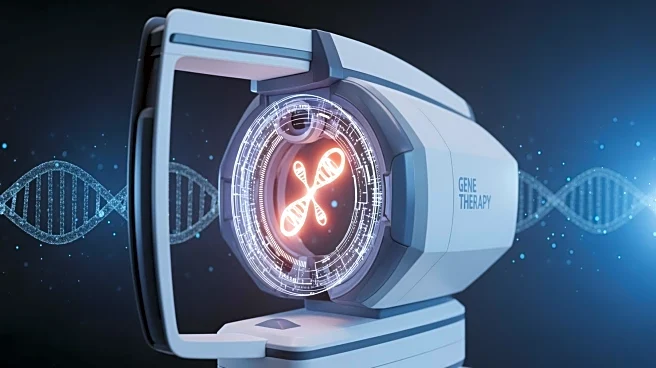What's Happening?
Recent advancements in ophthalmic technology have significantly improved diagnostics and treatment options for eye diseases. Artificial intelligence (AI) has been increasingly utilized to detect and manage ocular conditions such as diabetic retinopathy,
glaucoma, and age-related macular degeneration. AI systems like IDx-DR are FDA-approved for autonomous detection of diabetic retinopathy, while deep-learning models assess optic nerve damage in glaucoma. Gene therapy has also progressed, with Luxturna being the first FDA-approved gene therapy for inherited retinal diseases. Emerging techniques like CRISPR/Cas9 and optogenetics are being explored for visual restoration in degenerative eye diseases, offering potential treatments for conditions like retinitis pigmentosa and Stargardt disease.
Why It's Important?
The integration of AI and gene therapy in ophthalmology represents a paradigm shift in eye care, offering more precise diagnostics and personalized treatment plans. AI's ability to automate screening and optimize treatment planning can significantly reduce the burden on healthcare providers and improve patient outcomes. Gene therapy and optogenetics provide hope for long-term control and potential cures for genetic eye diseases, which could transform the lives of patients with conditions previously deemed untreatable. These advancements could lead to reduced healthcare costs and improved quality of life for millions of Americans affected by eye diseases.
What's Next?
Continued research and clinical trials are expected to further validate the efficacy of AI and gene therapy in ophthalmology. As AI systems become more integrated into clinical workflows, challenges such as data quality, regulatory approval, and clinician trust will need to be addressed. The development of non-viral vector systems for gene therapy could mitigate risks associated with immune reactions and genetic mutations. Optogenetics therapies like MCO-010 are undergoing trials and may soon offer new treatment options for retinal degenerative diseases. The future of ophthalmic care will likely see increased collaboration between technologists and clinicians to ensure ethical and effective implementation of these technologies.
Beyond the Headlines
The ethical implications of AI in healthcare, particularly regarding transparency and decision-making processes, are significant. Ensuring that AI systems are interpretable and integrated seamlessly into clinical practice is crucial to gaining clinician trust. Gene therapy raises questions about genetic modification and its long-term effects, necessitating careful consideration of ethical standards. The potential for personalized medicine through AI and gene therapy could revolutionize patient care, but it also requires robust legal frameworks to protect patient privacy and prevent misuse.
















